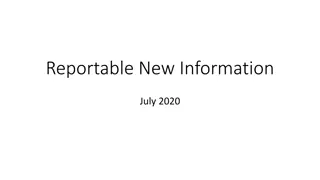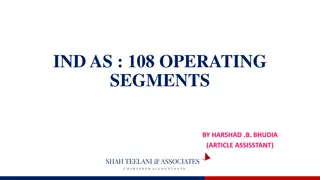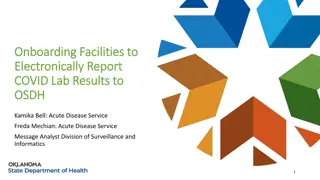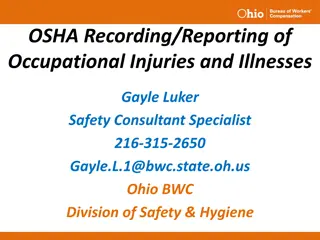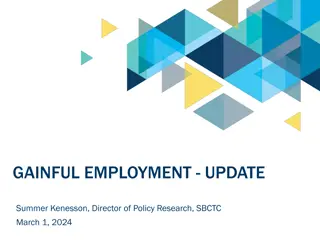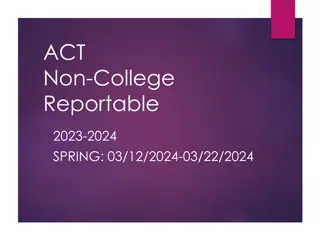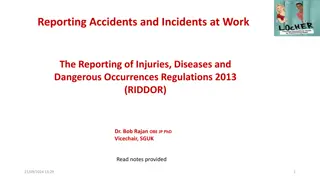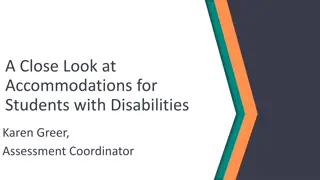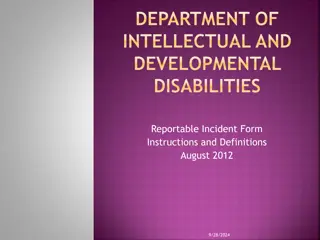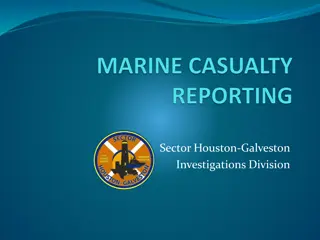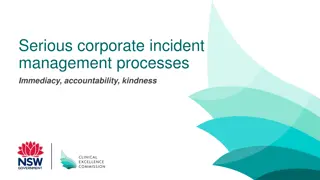Reportable New Information Reporting
Reportable New Information (RNI) refers to any new information that may impact an IRB-approved human subjects research study. This includes adverse events, unanticipated problems, protocol deviations, and more. Non-compliance with regulations can also trigger RNI reporting requirements.
Download Presentation

Please find below an Image/Link to download the presentation.
The content on the website is provided AS IS for your information and personal use only. It may not be sold, licensed, or shared on other websites without obtaining consent from the author. Download presentation by click this link. If you encounter any issues during the download, it is possible that the publisher has removed the file from their server.
E N D
Presentation Transcript
REPORTABLE NEW INFORMATION REPORTABLE NEW INFORMATION December 7, 2022
Agenda What is RNI? Categories of RNI Reporting RNI Amendments as a Result of RNI 2
What is Reportable New Information? Any new information that may impact on the conduct of an IRB-approved, human subjects research study or the safety and welfare of the participants in that study. RNIs must be reported to the IRB RNIs are classified into one or more of the following categories: Adverse Events (AEs) Unanticipated Problems (UPs) Non-Compliance Protocol Deviations (PD) Other Information 3
Adverse Events (AE) Definition Types Examples Any untoward or unfavorable medical occurrence in a human subject, including any abnormal sign (for example, abnormal physical exam or laboratory finding), symptom, or disease, temporally associated with the subject s participation in the research, whether or not considered related to the subject s participation in the research. Adverse Event (AE) Non-life-threatening reactions not mentioned as possible risks in the Consent Accidental Injuries Any other unexpected and related or possibly related (as determined by the PI) event that is normally not considered serious Serious Adverse Event (SAE) Any untoward medical occurrence that meets any of the following criteria: Results in death Life-threatening (refers to an event in which the patient was at risk of death at the time of the event; it does not refer to an event which hypothetically might have caused death if it were more severe) Requires inpatient hospitalization or prolongation of existing hospitalization Results in persistent or significant disability/incapacity Results in a congenital anomaly/birth defect Unanticipated Adverse Device Effect (UADE) Any serious adverse effect associated with a device. 4
Non-Compliance (NC) Definition Types Examples Failure to adhere to federal, state, or local regulations governing research, organizational policies, or determinations made by the IRB Non-Compliance Lapse in IRB Approval (without continuation of activities) Failure to respond to IRB inquiries Engagement of new study personnel without IRB approval Engagement of new study site without IRB approval Fail to maintain copies of regulatory approvals and documents Serious Non-Compliance Performing non-approved study procedures Lapse in IRB Approval (with continuation of activities) Inappropriate destruction of study records or study samples Failure to follow safety monitoring plan Falsifying research or medical records Continuing Non-Compliance Recurring non-compliance, protocol deviation, consent issue, etc. 5
Non-Compliance (NC) Definition Types Examples Failure to adhere to federal, state, or local regulations governing research, organizational policies, or determinations made by the IRB Minor Consent/HIPAA Issues Use of outdated/expired consent form Missing original signature page Missing subject signature, printed name, or date Missing consenter signature, printed name, or date Copy of consent not provided to subject Major or Continuing Consent/HIPAA Issues No documentation of informed consent process Consenting subjects without or during lapse of IRB approval Consenter not listed on IRB approval Recurring minor consent issues 6
Protocol Deviations (PD) Definition Types Examples Unplanned excursion, either intentionally or non-intentionally, from the protocol, by either the study team or the subject, that is not implemented or intended as a systematic change. Minor Protocol Deviation Exceeding approved sample size/enrollment goal Study Visit outside of visit window Error resulting in drug dosage higher than approved but with no side effects Failure of subject to return study medication/device Failure to follow study protocol (no effect on subject safety) Major Protocol Deviation Intentional deviation from protocol in non- emergency setting Enrollment of subject(s) not meeting inclusion/exclusion Failure to follow study protocol (may affect subject safety) Any medication error involving dosing, administration Deviations by the study participant that may affect safety Missed Visit where safety outcomes are assessed Emergency Deviation Changes made to the protocol without IRB approval to eliminate immediate harm Incarceration of a Study Participant 7
Unanticipated Problems (UP) Definition Types Examples An event that occurs in the research that may cause harm to participants (including physical, psychological, economic or social) and is: 1) unexpected; 2) related or possibly related to participation in the research; and, 3) potentially increases the risk of harm to the subject or others Breach of Confidentiality or Privacy Non-encrypted laptop/flash drive containing identifiable participant data was stolen Non-IRB approved person reviewing identifiable data *Other reportable new information may also meet the definition of Unanticipated Problems. Any RNI that also falls into this category must be promptly reported to the IRB. 8
Other Information Definition Types Examples Miscellaneous reportable new information that should be reported to the IRB but does not fit into the above categories. Hold/Suspension/Terminati on Results of Audit/Inspection by Federal Government If audit results in the issuance of a 483 New FDA Black Box Warning Significant or Unresolved Subject Complaint State Medical Board Hospital Staff Action AEs and UPs for a Multi-Site study that DO NOT occur locally 9
When Should You Report RNIs? PROMPT REPORTING NON-PROMPT REPORTING Time Frame: Next Renewal or Closure Method: Event Tracking Log RNIs that Do Not Require Prompt Reporting Unexpected and related/possibly related AEs Minor Non-Compliance Minor Consent/HIPAA Issues Minor Protocol Deviations AEs and UPs that DO NOT occur locally Time Frame: 5 business days of becoming aware Method: Reportable Event Application RNIs that Require Prompt Reporting Serious AEs Unanticipated Adverse Device Effect Serious or Continuing Non-Compliance Major or Continuing Consent/HIPAA Issues Major Protocol Deviations Emergency Deviations Incarceration of Study Participant Breach of Privacy/Confidentiality Hold/Suspension/Termination Results of Audit/Inspection by Government New FDA Black Box Warning Significant/Unresolved Subject Complaint State Medical Board Hospital Staff Action 10
Amendments as the Result of RNIs Submit, as soon as practical, a request for study modification if the RNI elicits, in the judgement of the PI, a change in the study status, protocol, procedures or documents such as the consent form or recruitment material. The IRB may require additional/different changes as a result of its review even if the PI has concluded that no changes are warranted. NOTE: UPs generally will warrant consideration of substantive changes in the research protocol or informed consent process/document or other corrective actions in order to protect the safety, welfare, or rights of subjects or others. 11
Save the Date! Date Time Topic 01/11/2023 12:00PM Emergency Preparedness in Research 02/01/2023 12:00PM Informed Consents & HIPAA Authorization 03/01/2023 12:00PM Expanded Access Use of a Test Article 12
Resources IRB Website Reportable New Information: https://www.lsuhsc.edu/administration/academic/ors/irb/reportable_new_in formation.aspx Types & Examples of RNIs (HRP-2631): https://www.lsuhsc.edu/administration/academic/ors/irb/docs/HRP- 2631_RNI%20Table%20for%20Study%20Personnel_v2.0_09.12.22.pdf Event Tracking Log (HRP-2220): https://www.lsuhsc.edu/administration/academic/ors/irb/education_guidanc e_instructions.aspx 14













